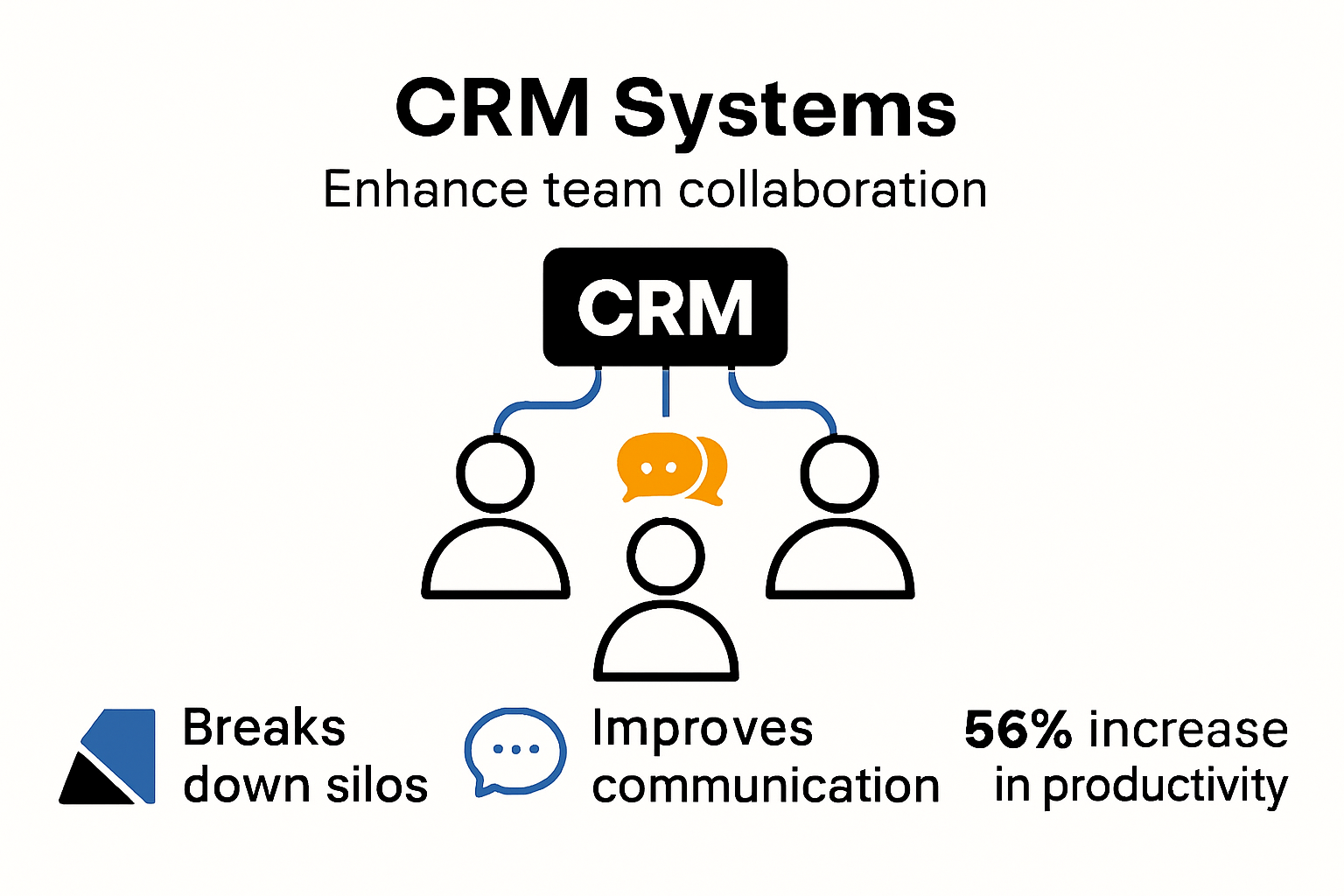CRM systems are quickly becoming the silent engine behind high performing teams. Think about this. Integrating intelligent systems with workflows in 2025 can improve communication efficiency by a staggering 137 percent. Yet most companies still treat CRM like a digital address book instead of the strategic powerhouse it truly is. The real surprise is how deeply the right CRM can reshape collaboration and productivity for every department—unlocking results you would never expect.
Table of Contents
- How Crm Enhances Team Collaboration
- Boosting Productivity Through Crm Systems
- Key Crm Benefits For Different Team Roles
- Choosing The Right Crm For Your Team In 2025
Quick Summary
| Takeaway | Explanation |
|---|---|
| CRM fosters team collaboration | Centralized platforms enhance information sharing, breaking down silos between departments. |
| CRM automates routine tasks | Automation streamlines workflows, allowing teams to focus on high-priority tasks instead of manual data entry. |
| Data-driven insights improve decision-making | CRMs provide actionable insights, enabling leaders to make informed choices quickly based on real-time data. |
| CRM enhances customer service efficiency | Comprehensive customer profiles empower service teams to provide personalized and timely support. |
| Choosing the right CRM is strategic | Assess organizational needs and involve stakeholders to select a CRM that fits both current and future requirements. |

How CRM Enhances Team Collaboration
Team collaboration represents a critical foundation for organizational success. Customer Relationship Management (CRM) systems have emerged as powerful tools that transform how teams communicate, share information, and work together effectively.
Breaking Down Organizational Silos
Traditionally, different departments operated in isolation. Marketing teams rarely communicated extensively with sales, and customer service teams worked independently. Research published in the Journal of Business Research reveals that CRM technology breaks down these organizational barriers by creating a centralized platform where all team members can access and share critical customer information.
This centralization eliminates information fragmentation. When a sales representative captures a new lead’s details, marketing can immediately understand the customer’s potential. When customer service resolves an issue, the sales team gains insights into client satisfaction levels. Such seamless information flow ensures that every team member has a comprehensive view of customer interactions.
Real Time Collaboration and Communication
A study in Information & Management demonstrates how collaborative CRM systems support knowledge creation processes across organizations. These platforms enable instant communication, allowing team members to:
- Track interactions in real time
- Share customer insights immediately
- Coordinate response strategies quickly
- Assign tasks with clear accountability
Imaging a scenario where a potential client makes an inquiry. With a robust CRM, the initial contact can be instantly routed to the most appropriate team member, with full context of previous interactions. No more lost emails or repeated explanations.
Enhancing Collective Intelligence
Modern CRM systems are more than simple contact management tools. They represent intelligent platforms that aggregate data, provide actionable insights, and support collective decision making. By capturing every customer interaction, these systems create a shared knowledge base that grows more valuable over time.
An action research study in the JISTEM Journal of Information Systems and Technology Management highlights how CRM strategies can transform organizational communication. Teams gain the ability to learn from each interaction, continuously improving their collaborative approaches.
Moreover, these systems support transparency. Managers can track team performance, identify collaboration bottlenecks, and recognize outstanding team efforts. Check out our guide on collaborative decision making to understand how technology is reshaping team dynamics.
As businesses become more complex and customer expectations rise, CRM systems will continue to be pivotal in fostering team collaboration. They are no longer optional tools but essential platforms for modern, agile organizations seeking to maintain competitive advantages through superior teamwork and customer understanding.
Boosting Productivity Through CRM Systems
Productivity remains the cornerstone of organizational success, and CRM systems have emerged as powerful tools for transforming workplace efficiency. These sophisticated platforms do more than manage customer relationships they fundamentally reshape how teams work and allocate their resources.
Automating Routine Tasks
Modern CRM systems eliminate countless hours of manual administrative work. Research from the 2025 study on AI Agents and Teamwork reveals that integrating intelligent systems into workflows can increase communication efficiency by 137% and allow workers to focus 23% more on high-value content generation tasks.
Consider the traditional process of tracking customer interactions. Without CRM, team members spend hours manually logging emails, updating spreadsheets, and cross-referencing communication threads. A robust CRM automates these processes, instantly capturing and categorizing interactions, generating reports, and providing real-time insights without human intervention.

Intelligent Resource Allocation
A groundbreaking study on Generative AI and Team Performance demonstrates that teams augmented with intelligent systems significantly outperform traditional collaborative models. CRM systems play a crucial role in this transformation by:
- Prioritizing high-value interactions
- Identifying potential bottlenecks
- Suggesting optimal resource distribution
- Providing predictive analytics
These platforms use advanced algorithms to analyze historical data, predict customer behavior, and recommend the most effective strategies for team engagement. By understanding which interactions require immediate attention and which can be handled through automated responses, teams can dramatically improve their operational efficiency.
Data-Driven Decision Making
Research in University Business highlights how CRM systems centralize information and transform raw data into actionable insights. This centralization enables leaders to make informed decisions quickly, reducing time spent on manual analysis and increasing strategic responsiveness.
Moreover, these systems provide transparent performance metrics. Managers can instantly view team productivity, track individual contributions, and identify areas for improvement. Check out our guide on lead management strategies to understand how technology is revolutionizing business performance.
As we move deeper into 2025, CRM systems are no longer optional luxuries. They represent essential infrastructure for organizations seeking to maximize productivity, optimize team performance, and maintain competitive advantages in an increasingly complex business environment. The ability to work smarter, not just harder, defines modern organizational success.
To give readers a clear overview of the quantitative impact of CRM and automation on productivity (as cited in research), review the table below summarizing key statistical benefits mentioned in this section:
| Aspect | Research/Source | Reported Benefit/Statistical Data |
|---|---|---|
| Communication Efficiency | 2025 study on AI Agents and Teamwork | +137% improvement |
| Time Spent on High-Value Tasks | 2025 study on AI Agents and Teamwork | +23% more focus |
| Team Performance with Intelligent Systems | Study on Generative AI and Team Performance | Significant outperformance (qual.) |
Key CRM Benefits for Different Team Roles
CRM systems are not one-size-fits-all solutions but powerful platforms that deliver unique advantages to different team roles. By understanding how these systems transform work across departments, organizations can unlock unprecedented levels of efficiency and collaboration.
Sales Team Optimization
According to Microsoft Dynamics 365, CRM systems provide real-time customer information that enables sales professionals to identify and prioritize opportunities with unprecedented precision. Sales representatives gain immediate access to comprehensive customer interaction histories, allowing them to craft personalized engagement strategies.
These platforms enable sales teams to:
- Track lead progression in real time
- Analyze customer interaction patterns
- Predict potential sales opportunities
- Streamline follow-up processes
By transforming raw data into actionable insights, CRM systems help sales professionals focus their energy on high-potential prospects rather than getting lost in administrative tasks.
Marketing Team Capabilities
Forbes Advisor highlights that CRM platforms centralize customer data, allowing marketing teams to develop more targeted and personalized communication strategies. Modern marketing is about precision and relevance, and CRM systems provide the technological backbone for achieving these goals.
Business News Daily notes that CRM software automates complex tasks like drip campaigns, freeing marketing professionals to focus on creative and strategic work. The systems offer detailed analytics that help teams assess campaign performance, understand audience behavior, and continuously refine their approaches.
Customer Service Transformation
Customer service teams benefit dramatically from CRM integration. By maintaining comprehensive interaction records, representatives can:
- Understand complete customer histories
- Resolve issues more quickly
- Provide personalized support
- Identify potential service improvements
The ability to access detailed customer profiles means that service teams can move beyond generic responses and deliver truly individualized experiences. Each interaction becomes an opportunity to build stronger relationships and demonstrate organizational commitment.
Learn more about our approach to team collaboration and how technology is reshaping interdepartmental communication.
As we progress through 2025, CRM systems will continue evolving from mere contact management tools to intelligent platforms that empower every team role. By providing role-specific insights and automation, these systems represent a critical investment in organizational agility, performance, and customer satisfaction.
Below is a summary table that outlines the unique CRM benefits provided to Sales, Marketing, and Customer Service teams, helping readers quickly compare their department-specific advantages.
| Team Role | Key CRM Benefits |
|---|---|
| Sales | Real-time customer data, track lead progression, predict opportunities, streamline follow-ups |
| Marketing | Centralized customer data, targeted communication, campaign/analytics automation |
| Customer Service | Comprehensive interaction records, faster issue resolution, personalized support |
Choosing the Right CRM for Your Team in 2025
Selecting the ideal CRM system is a critical decision that can significantly impact your organization’s efficiency and growth. As we navigate the complex technological landscape of 2025, understanding how to choose the right CRM becomes more crucial than ever.
Evaluating Organizational Needs
The Open University Business School emphasizes the importance of aligning a CRM system with specific business goals and organizational requirements. This alignment goes beyond basic functionality and requires a comprehensive assessment of your team’s unique workflow, communication patterns, and strategic objectives.
Key considerations include:
- Scalability to support future growth
- User-friendly interface for team adoption
- Integration capabilities with existing tools
- Data management and security features
- Mobile accessibility
Teams must move beyond surface-level evaluations and conduct thorough audits of their current processes, identifying pain points and potential automation opportunities.
Financial and Technical Considerations
TechTarget highlights the growing trend towards cloud-based CRM solutions driven by advancements in AI and automation. These modern platforms offer unprecedented flexibility and integration capabilities.
The U.S. Chamber of Commerce reports that the average CRM budget ranges from $73 to $117 per user per month. However, cost should not be the sole determining factor. Organizations must consider:
- Total cost of ownership
- Implementation complexity
- Ongoing support and training
- Potential return on investment
Stakeholder Involvement and Implementation Strategy
Successful CRM adoption requires more than technological selection. It demands a holistic approach that includes comprehensive stakeholder engagement and change management. Create an evaluation team representing different departments to ensure the chosen system meets diverse needs.
Learn more about our approach to collaborative decision making to understand how technology selection can be a team-driven process.
Implementation tips include:
- Conduct thorough vendor demonstrations
- Request detailed product roadmaps
- Evaluate customer support responsiveness
- Plan comprehensive training programs
- Establish clear metrics for success
As businesses become increasingly data-driven, the CRM system transforms from a mere tool to a strategic asset. The right platform can unlock unprecedented insights, streamline operations, and create competitive advantages. By approaching CRM selection with a strategic, collaborative mindset, organizations can ensure they invest in a solution that not only meets current needs but also adapts to future challenges.
Frequently Asked Questions
How can CRM enhance team collaboration in 2025?
CRM enhances team collaboration by breaking down organizational silos, enabling real-time communication, and enhancing collective intelligence through shared customer data.
What are the key benefits of using CRM systems for productivity?
CRM systems boost productivity by automating routine tasks, allowing for intelligent resource allocation, and facilitating data-driven decision making based on real-time insights.
How should teams choose the right CRM for their organization in 2025?
Teams should evaluate their organizational needs, consider financial and technical aspects, and involve stakeholders in the selection process to find a CRM that fits their specific goals and workflows.
What unique advantages do CRM systems provide to different team roles?
CRM systems offer unique benefits such as real-time customer data for sales teams, centralized customer information for marketing teams, and comprehensive interaction records for customer service teams, ultimately improving effectiveness across all departments.
Transform Team Collaboration and Productivity With Gammatica
Are tasks lost in endless emails, and do your teams still struggle with silos, even after CRM adoption? The need for seamless collaboration and true workflow automation is greater than ever. As outlined above, modern organizations are searching for more than just another digital address book. They want centralized CRM, smarter automation, and real-time team insights to break through barriers and unlock growth.

With Gammatica.com, you do not have to face fragmented tools or wasteful manual processes any longer. Empower your teams to achieve more together. Discover powerful features like smart CRM management, dynamic Kanban boards, task automation, and real-time calendar coordination. Try Gammatica.com today to see how you can turn teamwork into your biggest advantage. Make the leap now and experience how world-class operational efficiency can help you save hours each week. If you are ready for smarter, more unified team management, start your journey with our project and team management platform now.
Recommended
- How to Manage Tasks Effectively in 2025: Proven Strategies for Leaders | Gammatica
- Lead Management for Beginners: 2025 Guide for Teams and Leaders | Gammatica
- Automation for Small Businesses: Essential Strategies for 2025 | Gammatica
- Project Progress Tracking: Strategies for Success in 2025 | Gammatica



